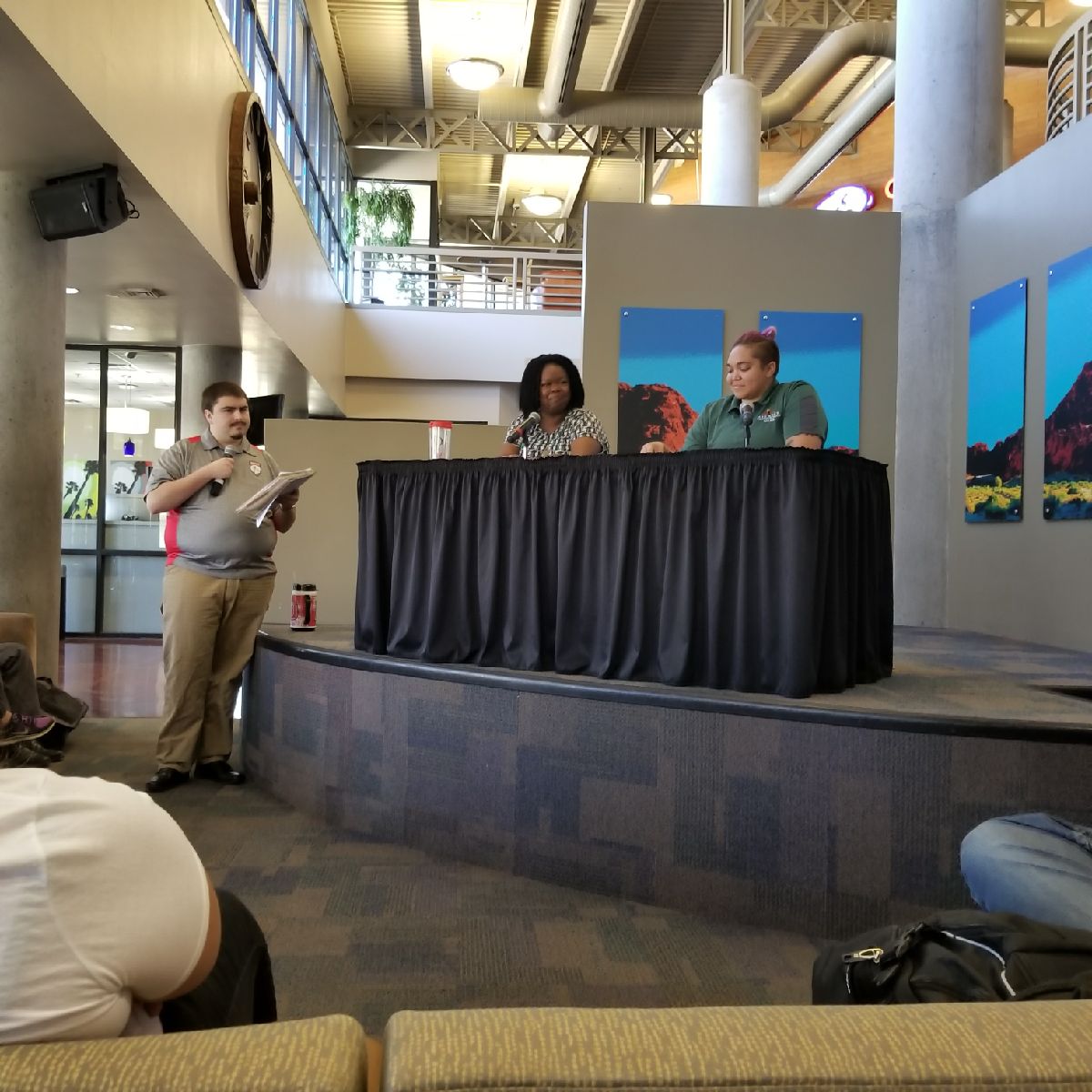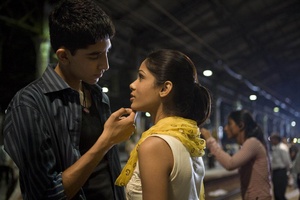As Dixie State University continues to grow, student diversity will expand as well, panelists said at the most recent Diversity Dialogue.
Casey Banner, the LGBTQ+ educator at Dixie State University’s Multicultural and Inclusion Center, acted as the moderator for the latest Diversity Dialogue and started the forum by announcing the subject. This latest dialogue concentrated on the intersectionality of race, ethnicity and sexual identity in regards to demographics, socioeconomic landscapes and belongingness at DSU.
DSU alumna Keshara Bjorkman and Zsa’ Jade Ervin, a senior English major from Los Angeles, spoke to interested students about their experiences as LGBTQ+ people of color. Questions ranged from asking the duo to define terms to religiosity in Southern Utah.
Banner opened the questions with asking both panelists about where they come from and the experiences they have had at DSU.
“I’ve had some interesting experiences [at DSU],” Ervin said. “I’ve had some ups [and] some downs, but the ups outweigh the downs.”
Bjorkman said it was a roller coaster, and said her first two years were less than desirable due to her lack of involvement. Bjorkman and Ervin said their college experiences were much better after finding communities on campus with similar thoughts and feelings.
Banner broadened the topic, asking the pair about their experiences in the St. George community.
“That’s a different level of interesting,” Ervin said. “I feel that because of my race, that’s one of the first things you can notice about me, I think it triggers certain people. They don’t think I notice them.”
Ervin said one of her first and most memorable experiences within the St. George community involved a woman running to her car, clutching her purse as Ervin walked down the street. Ervin continued to walk, she said, and turned around to see the woman back on the sidewalk, watching.
“I always like to tell people that I love [DSU] but I’m not a huge fan of St. George,” Bjorkman said. “The culture here at [DSU] is vastly different from the entirety of Washington County.”
Bjorkman said her tattoos, race and sexual identity made her stick out and feel out of place. When Bjorkman moved to St. George 10 years ago, she said the community was less accepting than they are today.
“I don’t know if it has anything to do with my race, but it definitely has something to do with my tattoos and my short hair,” Bjorkman said. “Like [Ervin] said, I don’t think people realize that we know they’re looking at us differently.”
Ervin said it is the “shuffling away” and whispers that people “think we can’t hear” that they notice most. Bjorkman said the stares that last “a little too long” are also noticeable.
“I think the reason [negative remarks] happen is because people aren’t used to [LGBTQ+ individuals],” Bjorkman said. “People just don’t know.”
Bjorkman said the main purpose of events such as the Diversity Dialogue is to educate people and help them to understand, in hopes that education will lead to acceptance.
Banner asked the girls the pros and cons of being racially, ethnically and sexual diverse.
“We bring a uniqueness to the room,” Ervin said.
Ervin said when she looks around her classes, she finds most of the time she is the only African American in the room. She finds that she tends to analyze literature differently compared to the other students in her class, and therefore able to lend a different perspective to the conversations, Ervin said.
Both Bjorkman and Ervin said they knew very little about their culture and background until they started actively searching for the information.
“Being [LGBTQ+] in the black community — I don’t think a lot of people realize — isn’t really a thing that is very well accepted in black culture,” Bjorkman said.
Bjorkman said she believes people are just coming to understand black culture, including herself.
When diving into sexuality, Ervin said because she “doesn’t look [like] a part of the community,” many people think she is an ally.
“From what I’ve learned about being black and [LGBTQ+], it’s a lot of fighting for being validated,” Ervin said.
Bjorkman said to a certain extent she has given up on being validated by others.
“Within this community, [the challenge is] about educating people who don’t necessarily know they want to be educated,” Bjorkman said. “When you want to explain one thing you have to explain a million other things, and it’s hard.”
Bjorkman said there is, surprisingly, a lot of discrimination even within the [LGBTQ+] community. Biphobia, panphobia and transphobia, for example, are a few of the sexualities taking the most heat today, Bjorkman said.
“The thing that I find funny all of the time is that people try to validate my identity,” Bjorkman said. “I always wonder, ‘Why you’re not me?’ No one should have to say what they are and then prove it.”
Ervin said the best way to promote acceptance is education, but “you can lead a horse to water but you can’t make them drink.” Ervin said the best way to educate people is through open conversation. Bjorkman said, for her, she is always open to answer questions for interested individuals, but for students there are resources, like the LGBTQ+ Resource Center.
“I find it interesting when people are afraid to ask questions,” Bjorkman said. “I always find that when people want to ask me [a question], they always start with, ‘Can I ask you a personal question?’”
Banner opened the questions to the audience after all seven of his questions were answered.
Sherry Collisi, a senior art major from Fontana, Calif., is an older-generation student and was among the other audience members, having come to learn more about the LGBTQ+ community.
“When I was [younger] there was only gay,” Collisi addresses Ervin and Bjorkman. “It was an umbrella term, so please explain the other letters for me.”
The panelists helped Collisi understand the most represented sexual identities in LGBTQ+, as well as sharing some of the more up and coming sexualities.
“It was enlightening,” she said. “All of the [new information] can be confusing. I’m thankful for events like this.”
The panelists were asked about their identities and religiosity. Ervin said she grew a thick skin based on her experience with missionaries when she first came to college. Bjorkman said her experience was quite different.
Bjorkman grew up within the Church of Jesus Christ of Latter-Day Saints in California and grew up with a lot of self hate because she was taught she was evil, she said. Bjorkman began to cry as she went on.
“I didn’t really come to terms with who I was and my sexuality until I was probably like 23; I’m 27 now, so very recently in my life,” Bjorkman said. “What bugs me about it so much is that this still happens all the time, and that’s why suicide rate in youth are so high in the state of Utah.”
Bjorkman said it breaks her heart because she went through it.
“Luckily a majority of my friends from high school that are still members of the LDS are accepting,” Bjorkman said. “I am lucky to have such a support system, as well as my family.”
Bjorkman said she knows there are a lot of people who don’t have supportive family, and she is grateful that she did.
“It was hard to grow up loving something like the church, and to be who I am today,” Bjorkman said.
Bjorkman and Ervin said when supporting LGBTQ+ friends and family, the first thing that should be done is research. Bjorkman said there are many resources available online, Equality Utah and the Trevor Project, and researching with someone else.
When asked what someone should do if they want to come out to unsupportive family whom are supporting them financially, Bjorkman said to wait. Don’t come out to unsupportive family if they are paying for home, gas or education, she said.
“It’s not really a popular answer, but it’s for someone’s safety,” Bjorkman said. “Time and place.”
To wrap up the forum, Bjorkman and Ervin addressed why Diversity Dialogues are important for not only people in underrepresented communities, but also majority communities.
“Having these dialogues is an easier format for people to ask question,” Ervin said. “It’s a way for people to feel more comfortable asking questions that they would be afraid to ask these questions in private.”



